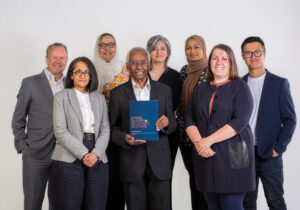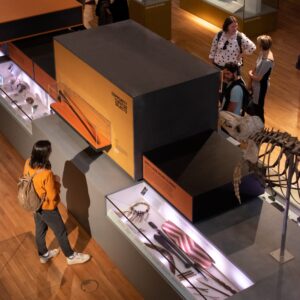Empire, Slavery & Scotland's Museums
This project, sponsored by the Scottish Government, has made recommendations on how Scotland’s involvement in empire, colonialism, and historic slavery can be addressed using museum collections and museum spaces.
Overview
This project, sponsored by the Scottish Government, presents recommendations from the Empire, Slavery & Scotland’s Museums independent Steering Group for how Scotland’s involvement in empire, colonialism, and historic slavery can be addressed using museum collections and museum spaces.
This nationwide project builds on existing work from within the equalities sector and from across Scotland’s museums, to explore the mechanisms of how Scotland can confront challenging histories within museum spaces.
Recommendations
In 2021 MGS coordinated a national consultation with Intercultural Youth Scotland and Diffley Partnership, to establish public and expert perspectives for how Scotland’s involvement in empire, colonialism, and historic slavery can be addressed using museum collections and museum spaces. As a result of this project, and based on the evidence gathered, the project Steering Group in June 2022 delivered a set of recommendations to the Scottish Government. In developing the recommendations, the Steering Group looked broadly at potential mechanisms for addressing the legacies of empire, colonialism, and historic slavery in museum spaces and through collections.
The recommendations are:
- Scotland should create a dedicated space to address our role in empire, colonialism, and historic slavery. A new organisation should be created to lead this work.
- Museums should ensure anti-racism is embedded in their workplaces and public spaces.
- Museums should involve the people of Scotland in shaping their work through co-production, to promote cultural democracy and participation for all.
- Museums should commit to research, interpret, and share the histories of Scotland’s links to empire, colonialism, and historic slavery.
- Museums should support efforts to promote and embed race equality and anti-racism in the curricula in a meaningful, effective, and sustainable way.
- Scottish Government should demonstrate their support for restitution and repatriation of looted or unethically acquired items in Scottish collections.
The recommendations are outlined in full in the report, Empire, Slavery, & Scotland’s Museums Recommendations. Print versions are available, for a copy please email Inform@museumsgalleriesscotland.org.uk
Led by expert advice
An independent Steering Group have recommended how Scotland’s existing and future museum collections and museum spaces can better recognise and represent Scotland’s colonial and slavery history. The Group is independently chaired by Sir Geoff Palmer, renowned scientist and human rights activist.
The Group is representative of relevant expertise and community interests, and diverse in its membership.
The Group members are:
- Sir Geoff Palmer, Chair
- Jatin Haria, Deputy Chair (Coalition for Racial Equality and Rights)
- Abeer Eladany (University of Aberdeen)
- Lewis Hou (Science Ceilidh and The Anti-Racist Educator)
- Parveen Ishaq (Edinburgh and Lothians Regional Equalities Council)
- Churnjeet Mahn (Strathclyde University)
- Steph Scholten (The Hunterian, ICOM Ethics Committee, MGS Board Member)
- Elena Trimarchi (David Livingstone Centre)
- Lisa Williams (Edinburgh Caribbean Association)
- Zandra Yeaman (The Hunterian)
The Steering Group have been supported by a range of invited advisors, specialists in relevant related fields, who led working groups on specific areas of enquiry.
Click on these links to find the Project Overview and the Terms of Reference.

Informed By Public Consultation
The recommendations were developed through a national consultation of workshops, focus groups, and the biggest public survey of attitudes to museums and racism conducted in Scotland by Diffley Partnership.
Evidence for the project includes The Legacy Report by Intercultural Youth Scotland and youth researchers. This strand of the consultation directly highlights the perspectives of Black people and People of Colour in Scotland and aims to address the underrepresentation of Black People and People of Colour (BPoC) in research and consultation, particularly the exclusion of young BPoC and their views.
Read the consultation evidence for the Recommendations
The role of MGS
Museums Galleries Scotland were commissioned to manage the Empire, Slavery & Scotland’s Museums project. Museums Galleries Scotland (MGS) recognises the impact that empire and colonialism has had on our institutions and their collections, and stands with anti-racist education worldwide. As the National Development Body for Scotland’s museums and galleries MGS has a responsibility to encourage and support museums to challenge and critically interrogate their own practices and collections.
Resources for the sector
These resources support, inform, and ask questions of the work of the Empire, Slavery & Scotland’s Museums project. They have been suggested and created by those working in the areas of empire, colonialism, historic slavery, and anti-racist practice in museums and galleries.
